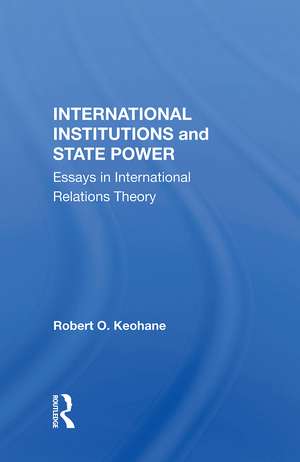International Institutions And State Power: Essays In International Relations Theory
Autor Robert O. Keohaneen Limba Engleză Hardback – 18 dec 2020
Preț: 740.47 lei
Preț vechi: 1029.82 lei
-28% Nou
Puncte Express: 1111
Preț estimativ în valută:
141.71€ • 147.40$ • 116.99£
141.71€ • 147.40$ • 116.99£
Carte tipărită la comandă
Livrare economică 14-28 aprilie
Preluare comenzi: 021 569.72.76
Specificații
ISBN-13: 9780367003104
ISBN-10: 0367003104
Pagini: 280
Dimensiuni: 149 x 229 mm
Greutate: 0.68 kg
Ediția:1
Editura: Taylor & Francis
Colecția Routledge
Locul publicării:Oxford, United Kingdom
ISBN-10: 0367003104
Pagini: 280
Dimensiuni: 149 x 229 mm
Greutate: 0.68 kg
Ediția:1
Editura: Taylor & Francis
Colecția Routledge
Locul publicării:Oxford, United Kingdom
Cuprins
Preface -- Neoliberal Institutionalism: A Perspective on World Politics -- A Personal Intellectual History -- International Institutions and Practices -- Theory of World Politics: Structural Realism and Beyond -- The Theory of Hegemonic Stability and Changes in International Economic Regimes, 1967–1977 -- The Demand for International Regime -- Reciprocity in International Relations -- International Institutions: Two Approaches -- Policy Choices and State Power -- Associative American Development, 1776-1860: Economic Growth and Political Disintegration -- State Power and Industry Influence: American Foreign Oil Policy in the 1940s -- Hegemonic Leadership and U.S. Foreign Economic Policy in the "Long Decade" of the 1950s
Notă biografică
Robert O. Keohane is Professor of Government at Harvard University. He is author of "After Hegemony: Cooperation and Discord in the World Political Economy" and coauthor (with Joseph S. Nye) of "Power and Interdependence: World Politics in Transition" (1997).
Descriere
The essays in this book trace the development of the author’s thinking about international institutions between 1980 and 1988. The introduction, written especially for this volume, summarizes and defends the "neoliberal institutionalism" that he advocates as a framework for understanding world politics.
